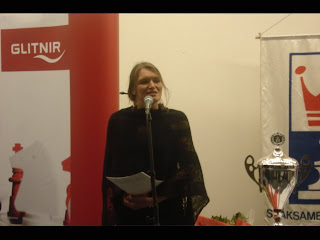 Hello Lilja, can you tell us something more about you, how did it all started in chess?
Hello Lilja, can you tell us something more about you, how did it all started in chess?
My grandmother taught me how to play chess when I was 5 years old. I come from a whole family of chess-playing. All my brothers play chess and my younger brother is a grandmaster - he even won the World Championship for 20 years and younger when he was just 17
(Lilja's brother is Helgi Ass Gretarsson). Unfortunately, he quit playing professional chess, he works as a lawyer, but given that I was brought up in an environment where everyone played chess it is a very natural thing for me to cherish it. I cherish it personally more than competitively, in fact, and I enjoy the beauty in chess when others play well. Somehow for me it is also a personal connection to my grandmother, whom I adored. She was a person of an incredible independence and free spirit, both on the chessboard and in life. She always played the King’s Gambit and always went for the win no matter what. I loved her dearly and she gave me chess. I never had a trainer or anything like that, but I had my grandmother as an inspiration.
(In spite of this fact Lilja has been eleven-time Icelandic women champion! D.B.)
And some time later you became president of the ICF…
I became the president of the Icelandic Chess Federation four years ago. I had before then been vice president, and before then I had been working quite hard on the women’s issue without being affiliated directly with the ICF, it was just on my own. I started a girls/women’s section at the School of Chess along with GM Helgi Olafsson, and really wanted more to see other girls play better chess than me, try to inspire them to become much better than we had, and ensure that they were encouraged and not ridiculed or side-stepped somehow. One has to choose I think in the end, either you try to help build up the chess world, or you actually play. I chose the former, and partly it was because of a feeling of resentment in what I sensed to be a male-chauvinistic and male-dominating world in chess which had a tendency to belittle women in one way or the other - sometimes by often very clever means that was hard to fight. My grandmother would have none of that, and neither would I! But again, it is a long way to go, as always, and it always takes a whole group of good people to change things, men and women, not just one individual. We are lucky to have a good group of people here in Iceland who wants to further the cause of chess.
You told me about your dream to have a woman team in the Olympiad.
I lived abroad for almost ten years and I was not sure that I would actually return to Iceland, but it was always my dream that we would send a women’s team to the Olympiad. As soon as I finished gymnasium in Iceland I went to America and studied at Harvard where I did my BA degree in history and political science. After that I went to live in Berlin and for the next years I lived and worked in various places in Europe. I did my Masters-degree in political philosophy at Cambridge University in England and I never really thought that I would again live in Iceland; I was set on staying in London as I really liked it there. However, I came home to Reykjavik in order to raise funds for the Icelandic national women’s team and help to ensure that there would be no doubt about sending a women’s team this time. Iceland had then not sent a women’s team to the Olympiad for 16 years and in my view sending a team was one of the necessary ways for girls to become more interested in playing the game. I mean, how can a people who claim to be a chess-loving-nation completely neglect the issue of women’s chess? Of course, everyone now pretends to have been interested in the issue, but this is far from the truth - the women who had gone in the old days were often ridiculed and there was a total lack of understanding. But finally a team was sent again, because we fought for it and had good people at the forefront who were positive, and while there is still an enormous work to do in this field Iceland now has more promising girls playing chess than it ever did before. We have a long way to go and we are still very much behind, but progress is being made. In my view the whole chess world, men and women alike, should see it as one of the essential steps towards progress and advancement for the game of chess to have more women involved, both playing and working towards a better social world of chess. In the long run it benefits all, also the men (and even the chauvinists!); there is no doubt about that in my mind.
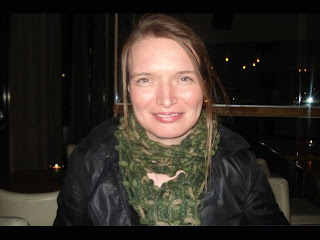 As you already know from 20.04 till 3 May EICC will take place in Plovdiv, Bulgaria. Shall we see representatives from Iceland?
As you already know from 20.04 till 3 May EICC will take place in Plovdiv, Bulgaria. Shall we see representatives from Iceland?
Yes, you will certainly see representatives from Iceland. The tradition on our part has usually been to send just one player in our name, and then if others get to go they have to at least partly be on their own. This time however we are going to send our two strongest active GMs, Hannes Hlifar Stefansson and Hedinn Steingrimsson. Let us just say that we are sending them not only because we strongly believe in them, but also because we know how nicely they will be treated in Bulgaria...
How will you choose your participants?They were chosen because they are our strongest active GMs today, and both take their chess very seriously.
Will they have concrete tasks for ranking?To do as well as they possibly can will be their task! There is not much more we can ask, and anyway, it is always up to the individual player to set him an inner goal. True ambition and sincere goal-orientation is always in the end up to the individual and his own responsibility. Your teams took part in ETCC 2003 that took place in Plovdiv. What are your memories about your stay in Bulgaria?Unfortunately, I was not personally in Plovdiv in 2003. However, I played in Youth World Championships in Varna many years ago - much too many years ago than I care to remember, to be frank. But I can tell you honestly that I found Bulgaria to be a wonderful place and I would love to visit again. Invite me!
 You are always invited! It is widely known in chess society that your country and federation helped to the legendary champion Bobby Fisher in a very difficult moment of his life. Can you tell us something more about it?
You are always invited! It is widely known in chess society that your country and federation helped to the legendary champion Bobby Fisher in a very difficult moment of his life. Can you tell us something more about it?Yes, it is true, the Icelandic Chess Federation responded immediately to Bobby Fischer’s arrest. I was president of the federation and the then vice president and me we walked immediately up to the US Embassy with a harsh letter of protest to Mr. Bush and demanded Bobby’s release. American acquaintances responded very angrily, and said that Fischer deserved this treatment. We strongly disagreed and you probably all know the rest, it has been much written about already. The RJF-committee was later established and a lot of good and ardent people took part in helping to free him. The Foreign Minister at the time, David Oddsson, made a lot of bureaucrats extremely nervous, but he stuck with it and demanded Bobby’s release, and then in the end the Icelandic Parliament almost unanimously voted for his Icelandic citizenship. I can only say that I am proud that my little country had the guts to stand up against Bobby’s arrest when no one else dared to act, and give Bobby Fischer a hand when he most needed it.
Did Fisher take part in your chess life during the years that he spent in Iceland? Did your chess federation keep contact with him?
No, Fischer did not take any part in public chess life. I personally never expected him to and I never asked him to, the only thing that I wanted for him was to be a free man to be able to do whatever he wanted. We all know that Bobby had publically turned away from classical chess and in my mind it was never an issue that he should play for Iceland or something like this, not in a million years. He should simply be a free man, getting to live his life in peace and quiet like he wanted to for so many years - but not in prison.
In the Medias various information concerning his death appeared. One of the information stated that there were very few people on his funeral. Is it true?Y
es, there were very few people at his funeral, and very appropriately so. Fischer was a very private person, as everyone knows, and he deserved a very private funeral. It would have been completely against his spirit to have media or a large crowd at the time of his death. I am glad that he got to be buried in peace and quiet.
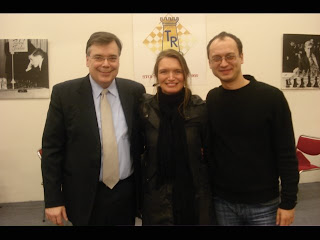 Chess is very popular in Iceland. Why? When it all did started?
Chess is very popular in Iceland. Why? When it all did started?The reasons for the popularity of chess in Iceland are of course many and varied. But I would first point out the terrific career of Iceland’s first GM, Fridrik Olafsson. Fridrik was playing top-world-chess in his day, and this was at a time when Iceland had very recently become an independent state, and had broken away from the rule of Denmark. This was then a time when a feeling of wanting to be self-assured and independent was building up, and with his international victories Fridrik was one of the proud symbols of how Icelanders could do well on their own in the world. Literally everyone knew whether Fridrik lost or won when he was playing tournaments, and in some places they even stopped the movies to shout out how his game had gone that night! Then, of course, comes the Match of 1972, the Match of the Century. I probably do not need to spell out what a tremendous effect this had on people here; it was truly a spectacular event for so many different reasons. It is among other things because of the Match that people here wanted to protect Fischer and take various risks in order to save him from prison. People remembered both Fischer and Spassky from 1972, and they found it so utterly wrong in the guts that he should be put away in prison - for playing chess.
Do you advertise it on television, radio?
Yes, we do all we can in order to get chess discussed on both radio and TV. We have very tough competition of course, from all kinds of other sports and the arts and other things so it is very hard. But we also work very hard at it and try to be imaginative, to create things that both include great and exciting chess but also something that catches people’s attention and interest along with it. So probably compared to many other countries we have a pretty good score on this record, although we would certainly like it to be much better.
How do you help to your best players?
Well, the state gives a monthly salary to people who hold a GM-title. True, it is not a very high salary, and you have obligations to teach chess, but at the same time I believe it is a system that exists nowhere else in the world, and it is meant to help along those who want to devote themselves to the game. In my opinion however we could do much better in creating a culture of disciplined and methodical training, and in getting international trainers to come to Iceland and teach. We are trying to do more of this now, but we still need to improve a lot in this field. Getting really good at chess in Iceland is very much up to the individual and self-learning, and we need more of a trainer-culture. But this is hopefully all to come in the future!
Do you have chess at schools?
Not all schools, no, and not even close to all and in no school is it obligatory. But it is alive and kicking in quite a few schools that are doing a wonderful job. This is in my opinion the key to a living chess culture - getting chess into the schools, every school. We are making progress, and on Fischer’s Birthday, 9 March, the City of Reykjavik announced in cooperation with the Chess Federation that it was planning to have all school in Reykjavik become "schools with chess" in the next couple years. Way to go!
About your biggest chess event-Reykjavik open-can you tell us something more about the organization, budget (here is the place to mention your sponsors), etc.
Well, you have been here Dejan, you tell about the organization! It has been truly a crazy workload for us at the federation, but we have truly done our best to make it nice and memorable. There are always things to do better, but we try very hard - and after all we are a federation of volunteers, so all of us are giving our time, energy and effort, in the hope of doing something nice for chess. What has been happening here is not just the Reykjavik Open, but also a Celebratory Program on Bobby Fischer’s Birthday, 9 March, then a tournament between some of his contemporaries, with Spassky as referee and Lombardy as commentator, and we finish the Chess Festival off with a 128-people Blitz Tournament. We believe in chess, and want the chess world and chess events to be done with care and love, so we try hard. We also have terrific sponsors. Our main sponsors are Glitnir Bank and the City of Reykjavik. Without them none of this would be possible.
Do you intend to organize more big events in your chess country?
Yes, of course! But then you must promise to write about them!!!
Thank you, Lilja. I promise!
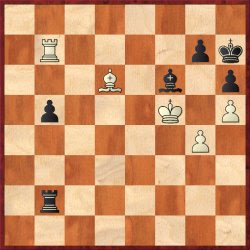 White's active pieces should compensate for a one-pawn deficit. 59.Ke6 [One way to proceed was to play 59.Be5! Bxe5 (59...Rf2+? 60.Ke6 Re2 61.Rxb5) 60.Kxe5 b4
White's active pieces should compensate for a one-pawn deficit. 59.Ke6 [One way to proceed was to play 59.Be5! Bxe5 (59...Rf2+? 60.Ke6 Re2 61.Rxb5) 60.Kxe5 b4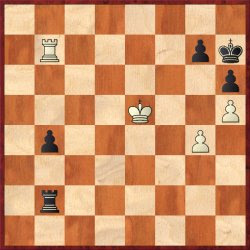 61.Rb8! b3 62.Ke4 Rb1 63.Kf3 g5 (or 63...b2 64.Kg2 g5 65.hxg6+ Kxg6=) 64.hxg6+ (White can also draw after 64.Ke4 b2 65.Kd3 Rg1 66.Rb7+ Kg8 67.Rxb2 Rxg4 68.Rb6) 64...Kxg6 65.Rb6+ Kf7 66.Kg2] 59...Bc3 60.Kf5 b4 61.Ke4 b3 62.Kd3 Bf6
61.Rb8! b3 62.Ke4 Rb1 63.Kf3 g5 (or 63...b2 64.Kg2 g5 65.hxg6+ Kxg6=) 64.hxg6+ (White can also draw after 64.Ke4 b2 65.Kd3 Rg1 66.Rb7+ Kg8 67.Rxb2 Rxg4 68.Rb6) 64...Kxg6 65.Rb6+ Kf7 66.Kg2] 59...Bc3 60.Kf5 b4 61.Ke4 b3 62.Kd3 Bf6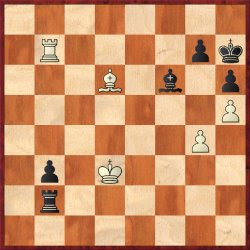 63.Kc4? [63.Be7 Bxe7 (63...Be5 64.Ke4 Bc3 65.Kd3) 64.Rxe7 Rg2 65.Re4 b2 66.Rb4 Rxg4 67.Rxb2 Rg5 68.Rh2 Kg8 69.Ke4 Kf7 70.Rh1 and I don't see how Black can win.] 63...Rc2+ 64.Kd3 Rc3+ 65.Ke4 Rc4+ 66.Kf5 b2 67.Ba3 Rc2 68.Ke4 Kg8 69.Kf5 Kh7 70.Ke4 Rd2 71.Kf5 Rd1 72.Bxb2 Rb1 73.Bxf6 Rxb7 74.Be5
63.Kc4? [63.Be7 Bxe7 (63...Be5 64.Ke4 Bc3 65.Kd3) 64.Rxe7 Rg2 65.Re4 b2 66.Rb4 Rxg4 67.Rxb2 Rg5 68.Rh2 Kg8 69.Ke4 Kf7 70.Rh1 and I don't see how Black can win.] 63...Rc2+ 64.Kd3 Rc3+ 65.Ke4 Rc4+ 66.Kf5 b2 67.Ba3 Rc2 68.Ke4 Kg8 69.Kf5 Kh7 70.Ke4 Rd2 71.Kf5 Rd1 72.Bxb2 Rb1 73.Bxf6 Rxb7 74.Be5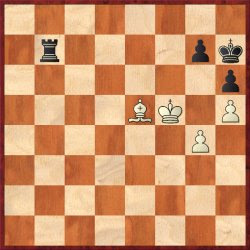 Black has made a lot of progress, but he still can't win! White's plan is simple: to target the g7-pawn with his bishop. Sooner or later Black will have to play ...g6 - and any reduction in pawn material helps the defender. 74...Rf7+ 75.Ke4 Rf1 76.Bf4 Kg8 77.Be5 Kf7 78.Bd4 Rb1 79.Kf5 Rb4 80.Bc3 Rb5+ 81.Be5 Ra5 82.Kf4 g6 83.hxg6+ Kxg6
Black has made a lot of progress, but he still can't win! White's plan is simple: to target the g7-pawn with his bishop. Sooner or later Black will have to play ...g6 - and any reduction in pawn material helps the defender. 74...Rf7+ 75.Ke4 Rf1 76.Bf4 Kg8 77.Be5 Kf7 78.Bd4 Rb1 79.Kf5 Rb4 80.Bc3 Rb5+ 81.Be5 Ra5 82.Kf4 g6 83.hxg6+ Kxg6 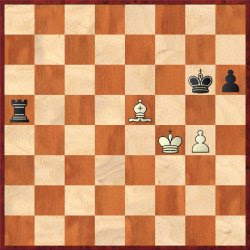 According on 6-piece tablebase (one place to find it is http://www.shredderchess.com/online-chess/online-databases/endgame-database.html) this position is a draw, though some caution is required. White should try to get his bishop to f4 or e3, from where it will target the h6-pawn. 84.Bc7! [There were only two other moves keeping the balance 84.Bd4! ; and 84.Bd6! ] 84...Rd5 85.Kg3?? This is where White made the main mistake! He had to get his bishop either to f4 or e3. That could be done with [85.Kf3; 85.Ke4; 85.Ke3; or 85.Bb6 ] 85...Rd3+! 86.Kf4 Rd4+! 87.Kf3 Kg5 Now White loses the pawn. 88.Bb6 Rf4+ 89.Kg3 Rxg4+ 90.Kh3
According on 6-piece tablebase (one place to find it is http://www.shredderchess.com/online-chess/online-databases/endgame-database.html) this position is a draw, though some caution is required. White should try to get his bishop to f4 or e3, from where it will target the h6-pawn. 84.Bc7! [There were only two other moves keeping the balance 84.Bd4! ; and 84.Bd6! ] 84...Rd5 85.Kg3?? This is where White made the main mistake! He had to get his bishop either to f4 or e3. That could be done with [85.Kf3; 85.Ke4; 85.Ke3; or 85.Bb6 ] 85...Rd3+! 86.Kf4 Rd4+! 87.Kf3 Kg5 Now White loses the pawn. 88.Bb6 Rf4+ 89.Kg3 Rxg4+ 90.Kh3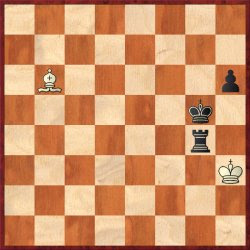 Black's win isn't trivial here - he must not advance his pawn too eagerly. Putting the pawn to h4 too soon could be a huge mistake, as the black king may need that square. 90...Rb4 91.Be3+ Kh5 92.Kg3 Rb3 93.Kf2 Ra3 94.Bf4 Kg6 95.Kg2 Ra6 96.Kg3 Kf5 97.Bc1 Rg6+ 98.Kh3 Rg1 99.Be3 Re1 100.Bf2 Rb1 101.Kg3 Rb3+
Black's win isn't trivial here - he must not advance his pawn too eagerly. Putting the pawn to h4 too soon could be a huge mistake, as the black king may need that square. 90...Rb4 91.Be3+ Kh5 92.Kg3 Rb3 93.Kf2 Ra3 94.Bf4 Kg6 95.Kg2 Ra6 96.Kg3 Kf5 97.Bc1 Rg6+ 98.Kh3 Rg1 99.Be3 Re1 100.Bf2 Rb1 101.Kg3 Rb3+ 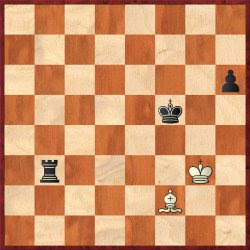 102.Kh4?! From a practical point of view it would be better to keep the king in the corner, forcing Black to show some technique. We already analysed such positions in Chess Today. [102.Kg2 Kg4 103.Bc5 Rb2+ 104.Kh1 Kh3 (104...h5 105.Bd6 h4?? 106.Bc7 Kh3 107.Kg1!=) 105.Kg1 Rg2+ 106.Kh1 h5 107.Bb6 h4 108.Bc7 Rc2 109.Bf4 Rc4 110.Be3 Kg3 111.Ba7 Rc1+ 112.Bg1 Kg4 113.Kg2 h3+ 114.Kh1 Rd1 115.Kh2 Rd2+ 116.Kh1 Kg3 117.Bb6 h2 118.Bc7+ Kh3–+] 102...Kf4 103.Be1 Rd3 104.Ba5 Rd1 105.Bc7+ Kf3 106.Kh5 Rh1+ 107.Kg6 Kg4 0–1
102.Kh4?! From a practical point of view it would be better to keep the king in the corner, forcing Black to show some technique. We already analysed such positions in Chess Today. [102.Kg2 Kg4 103.Bc5 Rb2+ 104.Kh1 Kh3 (104...h5 105.Bd6 h4?? 106.Bc7 Kh3 107.Kg1!=) 105.Kg1 Rg2+ 106.Kh1 h5 107.Bb6 h4 108.Bc7 Rc2 109.Bf4 Rc4 110.Be3 Kg3 111.Ba7 Rc1+ 112.Bg1 Kg4 113.Kg2 h3+ 114.Kh1 Rd1 115.Kh2 Rd2+ 116.Kh1 Kg3 117.Bb6 h2 118.Bc7+ Kh3–+] 102...Kf4 103.Be1 Rd3 104.Ba5 Rd1 105.Bc7+ Kf3 106.Kh5 Rh1+ 107.Kg6 Kg4 0–1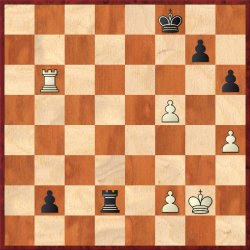 53.f6! It makes sense to undouble pawns while you can. Remember, reducing pawn material always helps the defender! [White could also play 53.Rb7 Ke8 54.Kf3! Kd8 55.Ke3 Kc8 56.Rb4 Rc2 57.f3 Black Black would maintain better chances, for example: 57...Kc7 58.Kd3 Rh2 59.Kc3 Kd6 60.Rb5 h5 61.Kd3 Kc6! 62.Rb8 Kd5 63.Rb5+ Kd6! 64.Kc3 Rf2 65.f4 Ke7] 53...gxf6 54.Rxf6+ [54.Kg3 Ke7 55.f3 Kd7 56.Kf4 Kc7 57.Rb3 Kc6–+] 54...Ke7 55.Rb6 Kd7
53.f6! It makes sense to undouble pawns while you can. Remember, reducing pawn material always helps the defender! [White could also play 53.Rb7 Ke8 54.Kf3! Kd8 55.Ke3 Kc8 56.Rb4 Rc2 57.f3 Black Black would maintain better chances, for example: 57...Kc7 58.Kd3 Rh2 59.Kc3 Kd6 60.Rb5 h5 61.Kd3 Kc6! 62.Rb8 Kd5 63.Rb5+ Kd6! 64.Kc3 Rf2 65.f4 Ke7] 53...gxf6 54.Rxf6+ [54.Kg3 Ke7 55.f3 Kd7 56.Kf4 Kc7 57.Rb3 Kc6–+] 54...Ke7 55.Rb6 Kd7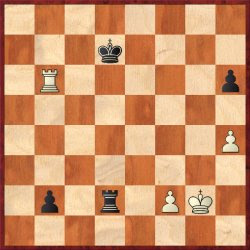











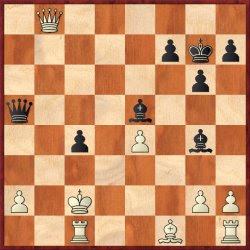
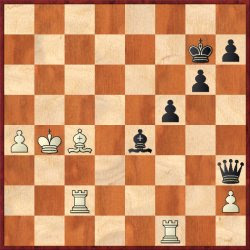
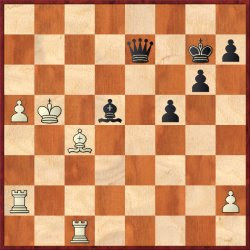
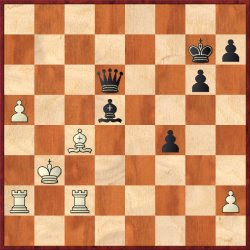
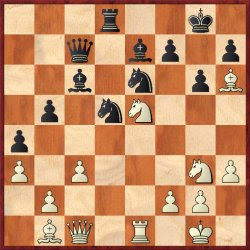
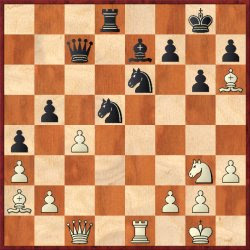
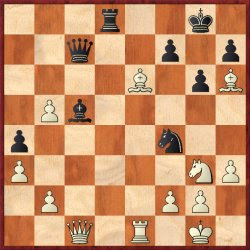
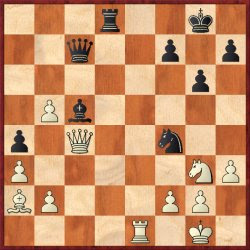
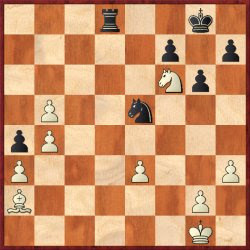






 1.g6 a2 2.g7 Kf7 3.Kh6 a1Q 4.Be6+ Kf6 Black is playing for mate... [4...Ke7 5.g8Q Qh1+ 6.Kg7 Qg2+ 7.Kh8+-] 5.e5+! but receives one. 5...Qxe5 6.g8N# Pogosiants
1.g6 a2 2.g7 Kf7 3.Kh6 a1Q 4.Be6+ Kf6 Black is playing for mate... [4...Ke7 5.g8Q Qh1+ 6.Kg7 Qg2+ 7.Kh8+-] 5.e5+! but receives one. 5...Qxe5 6.g8N# Pogosiants


